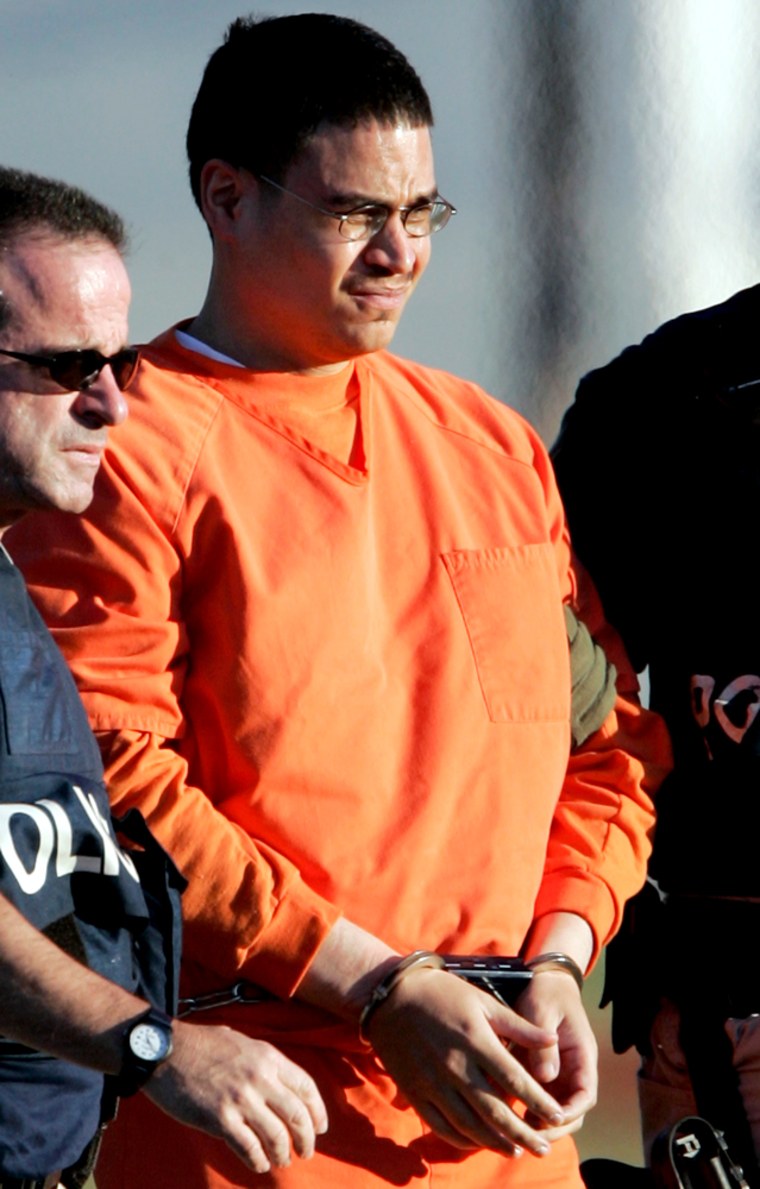Jose Padilla traveled overseas to peacefully study Arabic and Islam and not to train as an al-Qaida terrorist, his lawyer said in closing arguments Tuesday in a case rooted in 2002 allegations that he plotted to detonate a “dirty bomb” in the U.S.
“For five years, Jose Padilla has waited for this day, the day we could stand before you and ask for justice,” defense attorney Michael Caruso told jurors.
Far from being the “star recruit” of a terrorism support cell as prosecutors claim, Caruso said, the evidence — including phone calls intercepted by the FBI from 1993 to 2001 — shows only that Padilla went to Egypt in September 1998 to further his studies after converting to Islam.
“His intent was to study, not to murder,” Caruso said.
Padilla, a 36-year-old U.S. citizen, was held for 3½ years without charge as an enemy combatant in a Navy brig after his 2002 arrest at Chicago’s O’Hare International Airport for the purported dirty bomb plot.
Amid a legal fight over President Bush’s authority to continue holding Padilla, he was added to the Miami terrorism support case in late 2005. The “dirty bomb” allegations were quietly dropped, in part because Padilla was not provided a lawyer or read his Miranda rights when he was interrogated in military custody.
Three-month trial nears end
After a three-month trial, jurors were expected to begin deliberating Wednesday the guilt or innocence of Padilla and co-defendants Adham Amin Hassoun and Kifah Wael Jayyousi, both 45. They face life in prison if convicted of conspiracy to murder, kidnap and maim people overseas and as many as 15 years behind bars if convicted of two terrorism material support counts.
Prosecutors contend the three were part of a North American support cell providing money, supplies and recruits — including Padilla — for Islamic extremists.
“What al-Qaida was doing writ large, these defendants were doing on a smaller scale,” Assistant U.S. Attorney Brian Frazier said Monday.
Although Padilla’s lawyers put on no witnesses or evidence in his defense, Caruso spent more than two hours Tuesday poking holes in the government’s case.
The critical piece of prosecution evidence is a “mujahedeen data form” Padilla allegedly filled out in July 2000 to attend an al-Qaida training camp in Afghanistan. The form bears seven of his fingerprints, but Caruso said they are found only on the first page and the back of the final page — consistent with Padilla simply handling the form, rather than writing on it.
The form, which the CIA found in Afghanistan in late 2001 in a binder with dozens of similar forms, has Padilla’s birthday, U.S. citizenship and other personal identifying details, such as his abilities in Spanish, English and Arabic, and his education level. It was signed Abu Abdallah Al Mujahir, allegedly an alias of Padilla.
Padilla was never overheard on the FBI wiretaps talking in supposed code as others are alleged to have done, using words such as “tourism” and “football” that the prosecution says meant “jihad” or “eggplant” and “zucchini” to refer to military weapons and supplies.
In fact, his voice was heard on only seven of more than 300,000 intercepts and on a few others in which others discussed his whereabouts.
Lawyer: Don't be swayed by fears
Earlier Tuesday, Jayyousi lawyer William Swor told jurors that prosecutors repeatedly invoked al-Qaida in the trial “because they want to scare you” in hopes of winning convictions with flimsy evidence.
“The government is trying to appeal to your fears,” Swor said. “If they get you scared, maybe you’ll let your guard down and say, ’Maybe we better go with the government on this one.”’
Jayyousi is a naturalized U.S. citizen originally from Jordan, a U.S. Navy veteran and an engineer who was a public school official in Detroit and the District of Columbia. He also ran an organization called American Worldwide Relief in San Diego that Swor said provided aid to oppressed Muslims, not supplies for terrorists.
“Dr. Jayyousi wasn’t buying bullets. Dr. Jayyousi wasn’t buying ammunition. Dr. Jayyousi wasn’t sending fighters over there,” Swor said. “Dr. Jayyousi was providing relief.”
Similar arguments were made Monday by lawyers for Hassoun, a Palestinian born in Lebanon who overstayed his U.S. visa.
